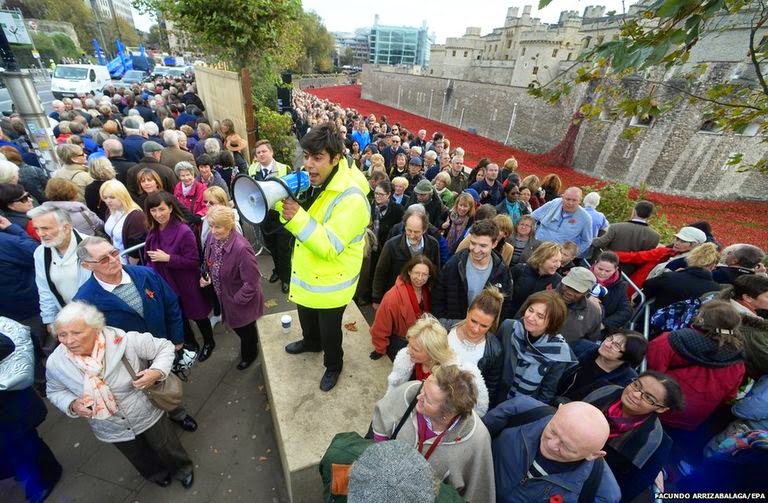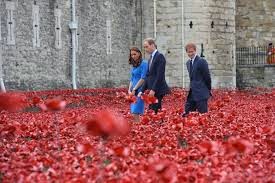Entitled Blood Swept Lands and Seas of Red, the art installation saw a staggering 888,246 poppies appear in the grounds of the Tower - one for every soldier from the UK, Australia and the Commonwealth killed during the Great War.
The poppy has long been the symbol of military remembrance in Britain since the First World War, when a poem from the time recalled the bright-red flower growing in the fields of Flanders.
Cummins, into the ground.

The first flower was planted on 17 July 2014 and the last was put in place on 11 November 2014 to coincide with Armistice Day.
The first ceramic poppy was planted in July and the final one will be added on 11 November 2014.
By then, 888,246 poppies filled the moat, each one representing a British or colonial death during the conflict.
The artwork was put together with the help of the stage designer Tom Piper, who said he had wanted to create a "fluid and organic feel to it, you could see it as blood, water or life force".
"The installation is transient, I found this poignant and reflective of human life, like those who lost their lives during World War One," said Cummins.
"It will be nice to keep it here but it isn't mine anymore - it belongs to the world now.
Paul Cummins , creative designer of the Sea of Poppies at the Tower .

During days and nights and late into the nights , millions of people gathered to admire the beautiful array on the moat which surrounded the ancient Tower of London .
The poppies range in height from 15cm
(6in) to 1m tall.
The installation began in early August and evolved over the weeks.The first ceramic poppy was planted in July and the final one will be added on 11 November 2014.
By then, 888,246 poppies filled the moat, each one representing a British or colonial death during the conflict.
The artwork was put together with the help of the stage designer Tom Piper, who said he had wanted to create a "fluid and organic feel to it, you could see it as blood, water or life force".
"The installation is transient, I found this poignant and reflective of human life, like those who lost their lives during World War One," said Cummins.
"It will be nice to keep it here but it isn't mine anymore - it belongs to the world now.
Paul Cummins , creative designer of the Sea of Poppies at the Tower .

The
Sea of Red Poppies was a sight to behold indeed. As expected, it drew an
estimated crowd of 4 million viewers to the Tower of London from all over the world for many
weeks .
Thousands of people had signed an e-petition calling for the poppies to remain.
To allow as many people as possible to see the installation, the hours that the site was illuminated was extended from 04:30 GMT until dawn and then from dusk until midnight.








But this request was not granted . The Sea of Poppies was dismantled, finally .
Large crowds gathered on the final day to catch a last view of the the beautiful and unique war memorial.
The Tower of London shut it gates and retained its reputation of being a massive crowd puller.

The final Clean -Up . All the poppies are gathered and carefully stored .

The ceramic poppies were on sale for £25 each with net proceeds, hoped to be in excess of £9.5 million, being shared equally amongst a group of carefully selected Service charities — The Royal British Legion, Confederation of Service Charities (COBSEO), Combat Stress, Coming Home, Help for Heroes and SSAFA (formerly the Soldiers, Sailors, Airmen and Families Association).
All poppies were sold by late October 2014 and delivered to those who ordered them.
Information about the delivery of poppies and whether more may become available for sale can be found at poppies.hrp.org.uk























No comments:
Post a Comment